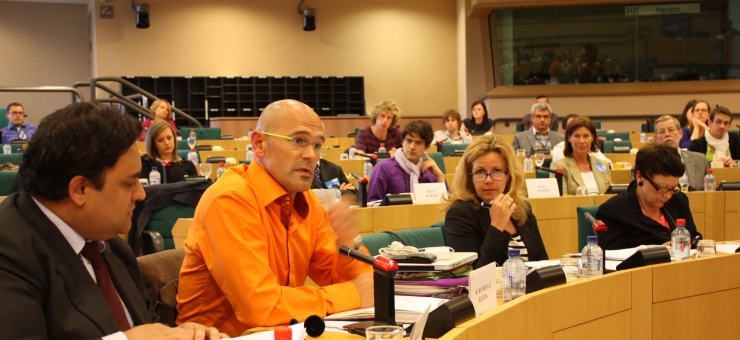Greens/European Alliance MEP Raises Questions About Prosegur in Colombia

The Green / European Alliance Member of the European Parliament Raul Romeva i Rueda, has tabled a series of questions that go right to the heart of the denial of trade union rights by the multi national Spanish Security Company Prosegur. Prosegur is coming under increased scrutiny over its behaviour in Colombia, in Brazil, in Peru and in Paraguay. The questions also ask what sanctions might be available to the European Parliament when a major company from a long standing EU member behaves in such an unacceptable way. Below is the full text of the written questions submitted.
`According to a complaint received by the Colombian National Union School (ENS), the Compañía Transportadora de Valores Prosegur, a Spanish multinational, is allegedly threatening and buying off workers to get them to waive their rights under the collective agreement and renounce their trade union and instead to subscribe to a Collective Pact proposed by the company. Back in 2010 the company’s board offered each employee who was a union member 4 million pesos (equivalent to about EUR 2 000) to leave the union and renounce the collective agreement, on condition that, if they went back to the union again, they would have to pay back this money. They used the same strategy again in December last year, when the Collective Pact was renewed, this time for 5 years — they offered each unionised worker 2 million pesos (equivalent to about EUR 1 000) to renounce the collective agreement.
According to the complaint received, this is not the only anti-union action taken by this Spanish multinational. It is alleged that ‘within the company there is a sort of apartheid operating. Workers are divided into two categories: union members and non-union members. This latter group are referred to as the “UNO group” and they have been given buttons to wear on their chests to differentiate them from the others.’
Bearing in mind that the European Union has entered into an FTA with Colombia, which in the section on sustainable development includes compliance with ILO regulations, what does the EU intend to do in cases such as this one involving the persecution of trade unions?
What mechanisms does the EU have available to exercise control over the activities of its companies in Colombia?
In cases such as these, which show us that corporate social responsibility as a voluntary mechanism is not enough, what legislation that is binding on companies operating in third countries does the EU envisage drawing up?`Ends.
For more information please see
http://www.europarl.europa.eu/sides/getDoc.do?pubRef=-//EP//TEXT+WQ+E-20...

